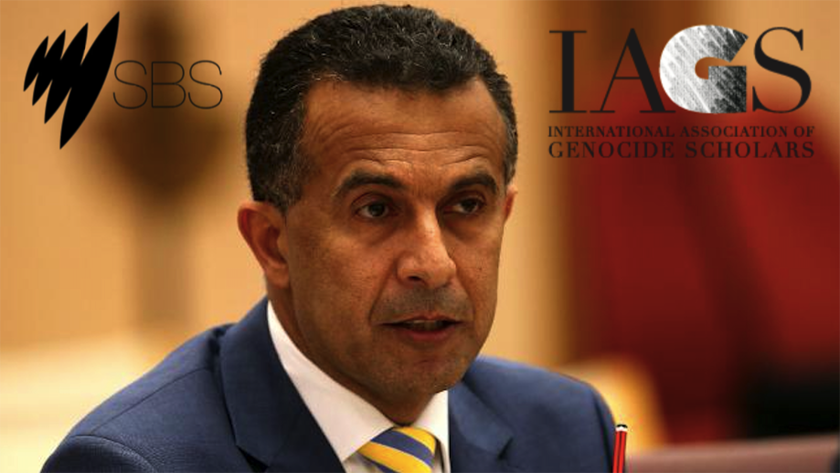International Association of Genocide Scholars slams SBS Australia for appeasing Armenian Genocide denial

CANBERRA: The International Association of Genocide Scholars (IAGS) has written an open letter to Head of Australia’s Special Broadcasting Corporation (SBS), Michael Ebeid, slamming his mischaracterisation of the Armenian Genocide during Federal Senate questioning last month.
This letter, from the foremost global historical authority on genocides, pours cold water over SBS’s editorial policy not to refer to the Armenian Genocide as “genocide”, saying: “Genocide denial is not history: it is ideological. And we are disappointed that a reputable organisation, such as SBS, has chosen this route.”
During Australian Parliament’s Senate Estimates in May 2017, Ebeid was grilled on the broadcaster’s unacceptable editorial position on the Armenian Genocide during an Australian Parliament Senate Estimates hearing by Greens Senator, Scott Ludlam.
Ludlam, who is the Foreign Affairs spokesperson for the Australian Greens, asked Ebeid to shed light on a May 15th article in The Australian, which claimed: “…SBS News and Current Affairs has a specific policy on referring to the Armenian genocide that prohibits its reporters from naming it as such. Instead reporters are instructed to refer to the event not as a genocide but as a ‘mass killing of Armenians considered by many to have been a genocide, which Turkey denies’.”
Ebeid responded: “We at SBS refer to it as ‘mass killing of Armenians considered by many to have been a genocide’ and I think that way we make sure that our viewers understand that this is a matter of contention that historians the world over dispute…”
The IAGS open letter, signed by its President, Professor Andrew Woolford says: “During this hearing, you were asked by Greens Senator Scott Ludlam about SBS’s policy regarding the naming of the Armenian genocide, which you called the “Armenian situation”. This is akin to calling the Holocaust the “Jewish situation”.”
“The Armenian genocide is also referred to as “mass killings”, which, of course, was the intent of the genocide, but framing any genocide in terms of the perpetrators’ intent, ignores the people that Senator Ludlam argues you are offending: the survivors and generations of victims. Genocide is about destruction, which continues for decades after the event, especially if the genocide is continually denied.”
“Your reasoning behind SBS’s policy is threefold: that a) the Australian government does not recognise the genocide, b) the UN does not recognise it and c) that historians “world over dispute” the genocide and there is a “lot of debate” regarding the existence of the genocide.”
“The sticking point for SBS is a) – that SBS would probably “change our stance” if the Australian government officially recognised the genocide. Does this apply to all Australian government policy, such as the difference between migrants and refugees, which the Australian government often muddles for political purposes?”
“The sticking point for us as genocide studies scholars is your argument that academically recognised historians dispute the genocide. This is a falsity. There are a handful of historians who deny the genocide who are not recognised as scholarly academics by the majority of genocide studies scholars.”
“We enclose the official IAGS policy on the Armenian genocide to counter SBS’s damaging denial claims and ask you to reconsider your policy. We also thank Senator Ludlam for his recognition of the genocide.”
Armenian National Committee of Australia (ANC-AU) Managing Director, Vache Kahramanian thanked the IAGS for their support.
“Denial of the Armenian Genocide is based on the myth that historical consensus has not been achieved on this matter,” Kahramanian said. “There is no greater global historical authority on genocides than the International Association of Genocide Scholars, and SBS will recognise that they have erred in their judgment when determining this offensive editorial position.”
Kahramanian added: “We hope SBS can admit this error by correcting it, and we will continue to make that case on behalf of Armenian-Australians and all who have suffered from genocide.”
The Ebeid hearing can be watched below:
